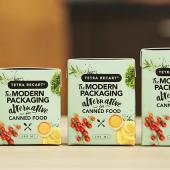Markets to be explored (2)
www.ice.gov.it The organisation ICE - Agency for the promotion abroad and the internationalization of Italian companies (under interim management) - has established a close collaboration with the magazine ItaliaImballaggio.
ICE‘s network of overseas offices will provide a regular update on the development of packaging in the short/medium term in given countries. Under observation, as a priority, the area of the Mediterranean rim, the Middle East and India: a focus which aims to offer points of interest to Italian companies to develop business opportunities.
For further information on the sector contact [email protected].
In Libya packaging and wrapping machines have a future, but… not a present! In this moment in time indeed that country is going through a period of economic stagnation, with long neglected infrastructures further damaged by the fierce civil war. The current economic and political situation the country is going through forces the Libyan authorities to for the moment concentrate on limited emergency type undertakings to restore basically needed services. In the public sector the interest to start up again continues to be strong, but this interest to date is countered by the difficulties deriving from the limited balances of the State.
This leads to a “domino effect” throughout the “private” sector, that has only just started to organize itself, and that fears problems deriving from the “stagnation” the country is currently going through. Practically speaking, everything is at a standstill. The “future scenario” is still an unknown quantity, both as regards what has been said above but, aboveall it could vary according to the “inclinations” of those who win the elections. Unfortunately, Gheddafi has left a legacy of devastation and the post-revolution reveals a nation that is martyred and divided but at any rate ripe for reconstruction. Though one needs to wait for the transition period to pass by.
The private sector is slowly organizing itself but it is still small, unwilling and reticent, while the public sector is bloated, inefficient and deformed by a system that favours personal connections rather than ability and performance. The “economic stagnation” is the result of this situation, but the future, if faced with serious commitment, without haste and with medium-to-longterm programs, could surely bring sustained satisfaction.
After the elections (if confirmed they will take place in June), the first two/three months will be needed to regulate the political, economic and legislative system of the country, at the same time laying the basis to relaunch the economy. One of the areas worth concentrating on will be the rebirth of the light industry, heavily penalised by Gheddafi’s regime.
Gheddafi, as well as concentrating on oil and gas, only built up the heavy industry (steel, cement) and impeded the growth of the light industry also because he considered it a legacy from the Italians.
Prior to Gheddafi’s arrival on the scene indeed, Libya, through the Italian community, produced and exported food products (fruit juices and mineral water, milk, fresh cheese, tunafish, fruit and vegetables, olive oil, dates, peanuts, flour,etc.) as well as furniture, leather goods, footwear, etc. After the Italians were chased out, Gheddafi “made a present” of the factories to the workers; over the years, the factories have practically “evaporated”. Only a few have survived and, among other things, they are still equipped with machines that date back to the seventies (excluding the fresh produce sector).
Most of the above works were in the hands of state concerns and the final “product” was for the most destined for the domestic market, that did not comply with to the control, quality and safety standards demanded by the international markets, to the point where the packaging and wrapping systems used are obsolete, slow and not in line with safety standards.
Hence the future of the Libyan light industry is in the hands of the private sector. Along with the abovementoned traditional production, that the government has already announced it wants to totally privatise, others will be added: leather goods, textiles, glass, wood, etc… or that is the industries that in the sixties allowed Libya to shine forth.
The current transition government is placing pressure on the Libyan Businessmans’ Association (a sort of Confederation of Libyan Industries), so that they might take the existing light industries under their wing and restart those that have been at a standstill for years. Obviously the existing industries are the easiest to “place” and that, according to those that intend taking them over, they should not only produce for the Libyan domestic market, but that should also expand onto foreign markets and, obviously, they will need to renew and/or update the existing “machine yard”; new concerns will also be created. Today there are but a few valid entrepreneurs interested in “rebuidling” the Libyan light industry, in particular the wood and footwear industry, the production of colors, paints and varnishes, aluminium profiles etc. The interest expressed by these entrepreneurs is aimed at their “Italian brothers” who intend participating with 50% of the investment. As far as the packaging and wrapping machines are concerned, there will shortly be a growth in demand for all types of machines required in the fresh produce industry (including the fishing industry), while on the medium to longterm where will be a demand for packaging and wrapping for footwear, plates, glasses, textiles etc. A demand which one hopes Italian industry will adequately respond to.
Considering that to sell machines in Libya a trade agent is required (the contract for which is governed by the Law n.6 2004 that declares «… the function of trade agent can only exclusively be carried out by persons with Libyan nationality or indeed persons with a registered office in Libya, entirely controlled by Libyan shareholders») Italian producers interested in Libya would need to carry out scouting actions and/or missions of presentation, so as to sound out the opportunities created by the demands of the postwar construction, well considering what has been stated in this article, in particular concerning the medium-to-longterm results obtainable.
The companies could carry out their marketing strategies, touching the main cities (Tripoli and Benghazi) to not only meet the local companies already “competent” on the subject, but also the new class of private entrepreneurs that is forming, with the objective of “preparing” for the recovery.
The ICE office in Tripoli is available to accompany and aid companies in their actions ([email protected])




















